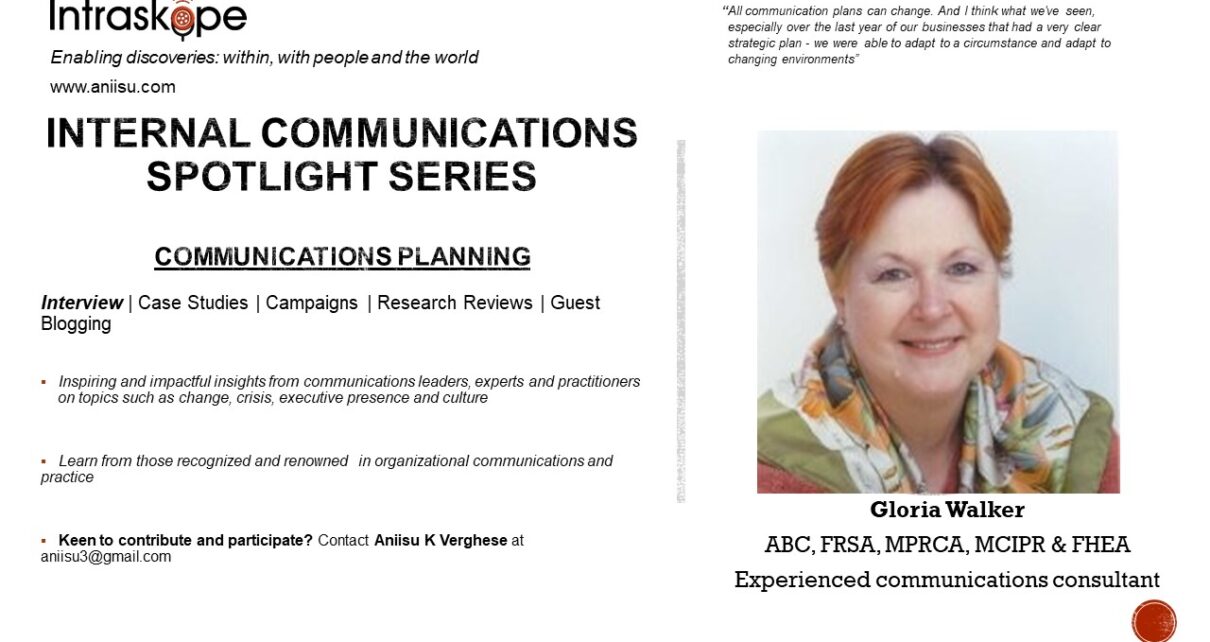Welcome to the 5th edition of Intraskope’s Spotlight Series featuring Gloria Walker, an experienced communications consultant in both internal and external communications. Having worked both in-house and in agencies, Gloria is equipped with a wide perspective of role of communications. She is experienced in research and planning work, as well as implementation and currently serves as a Professor of Practice at Hult International Business School. UK.
Why isn’t communications planning given much importance despite communicators knowing its value? How can communicators get better with strategic communications planning? What will help communicators to invest more in planning? I had the opportunity to chat with Gloria Walker, ABC, an experienced communications consultant in both internal and external communications. In this conversation, Gloria shares insights on the value of planning and how it can get embedded into the way communicators go about their important work. Watch this interview to know more.
“All communication plans can change. And I think what we’ve seen, especially over the last year of our businesses that had a very clear strategic plan – we were able to adapt to a circumstance and adapt to changing environments”, says Gloria.
Gloria Walker, ABC, FRSA, is a highly experienced practitioner with international experience in delivering results based communications programs to financial, energy, aerospace, automotive, consumer services and government organizations in the US, Europe, and Asia through both in-house and consultancy roles.
A graduate of West Virginia University (BS) and The University of Texas at Austin (MA), Gloria has taught at universities in the US and Thailand, has published several articles and has given presentations at professional and academic conferences in the US, UK, Slovenia, Thailand, Vietnam, India, Dubai and Turkey.
Gloria is also a Professor of Practice at the Hult International Business School and an active member of several professional associations, including the International Association of Business Communicators, the Public Relations and Communications Association where she is currently a member of the PR Council, the Chartered Institute of Public Relations (UK), and the European PR Education and Research Association.
About Intraskope’s Spotlight Series
In this series I interview key thought leaders on topics interrelated with internal communications such as culture, crisis, change, executive presence and leadership. The goal is to help unravel why they matter, what can leaders and communicators learn from experts and how we can put insights to practice. Watch these short interviews and get better at understanding these key topics and how you engage with internal communications.
Interview
- What is your understanding of how important is communication planning to organizations? There are surveys with say that not much time is given inside organization to planning and they don’t invest enough to plan the activities. Why do you think organizations plan less often?
Well, in my experience, planning is something we talk about a lot, but I’m not sure how much time we spend either training people in terms of how to do planning or talking about the importance of planning. In most of the roles that I have had, for me, planning is the first thing you do to really get to have a good understanding of your organization you’re working for – whether you are in an in house role or as consultants. And I think it’s very important, even to have that initial conversation. With if what the business is going to do is useful? Everything we do then is to track that feedback. If we aren’t connected – then a lot of things that they may not have the impact than they should.
2. What according to you are some of the key components of a great communication plan?
Well I think when we look at planning, whether it’s marketing or operations or anything else, the first part is understanding the situation that we’re going to in, what were our objectives. And I think once we understand the situation, we have an opportunity to use communication in ways that matter. So, it has to be very much connected. And I think this has been a problem to communicate. For a long time this has been a kind of stepping stone for planning. We don’t spend some time doing the right thing. Doing planning in any organization is something that occupies a lot of management time as it makes an impact. The practice of editing, that’s all good.
3. There is this thinking that communication plans are mostly very tactical in nature. So how do you make it strategic?
I think there are obviously two types of planning, strategic planning and tactical planning, Tactical planning is in some ways, a lot easier because you have a huge number of things, we can do in the present communication environment. I mean how many schools of thought and channels. There are new ones cropping up and as we move from one to the other, it is very easy to get swept away. But you may not get our messages to people when they need it most. Strategic planning is what provides context. It isn’t just kind of a glib statement, and it’s not about doing things right. It’s doing the right thing at the right time.
4. How much of flexibility, can you build into a communication plan and what was the expectations?
All plans can change. And I think what we’ve seen, especially over the last year of our businesses that had a very clear strategic plan – we were able to adapt to a circumstance and adapt to changing environments. As seen in the online shopping, and the developments in the wide acceptance of electric cars. A business plan, generally, is a minimum of five years, if not 10. Plans probably – three to five plans on the tactical side are probably a year, maybe three practical plans could be to change.
5. Does too much planning lead to paralysis? How do you get people to have communicators to think about moving from a plan to action?
Planning is that right action – the targets that we set. So, if we are doing our planning, well, you’re regularly monitoring snags. In your journey as a result, and while it’s nice and we need to understand why we are probably engineers. They need to have technical plans that need to change quite right. I don’t see you know planning and implementation as necessarily disconnected as monitoring allows us to review what’s happening, and then make the changes that we need to do as the campaign will take more programs.
6. In your journey as a consultant as academician, is there some example of an organization which has succeeded by communicating or planning?
As I do evaluate entries and different communications programs we see evidence of the organization and communications team that has done their planning. So, their execution is effective. You see increased integration of activities and functions within the organization. We cannot operate in a silo. Because what we do affects the whole organization.
Watch the complete video interview on YouTube or read the transcript below.
Missed the earlier episodes? Watch them here: D. Mark Schumann (Culture), Peter Yorke (Executive Presence), Sia Papageorgiou (Leadership Communications) and Dianne Chase (Strategic Storytelling).
You can also look up the ongoing Intraskope’s Spotlight on Internal Communication Series featuring practitioners from around the globe sharing best practices and perspectives.
Liked the interview? Post your comments and share it with your network.
Keen to contribute and participate in the Spotlight series? Write to me at [email protected]
Here are Internal Communications resources you can use:
- Learn: Internal Communications Fundamentals Course on Thinkific or Udemy
- Internal Communications Series: https://forms.gle/KcqmPzLwq7NQi5Km6
- Chat with Aniisu – Internal Communications: https://www.instamojo.com/intraskope/connect-with-aniisu-60-minute-personalized-d/?ref=store
- Internal Communications workshops: https://bit.ly/2zdBRl1
You can also visit my website www.intraskope.com and You Tube channel to know more about my work.
#IC #communicationsplan #planning #commsplan #strategicplanning #inspiration #internalcomms #communications #internalcommunications #leadership #covid19 #gloriawalker #intraskope

